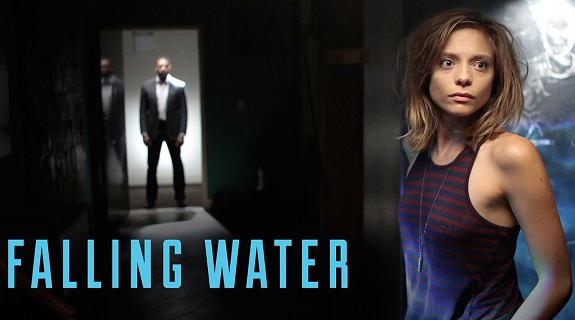The cast and producers of Falling Water, USA’s new psychological thriller, revealed some of the inspiration behind the show at New York Comic-Con on Saturday.
The one-hour original drama series premieres on USA on Thursday, October 13, at 10 p.m. EST, and follows the story of three unrelated people who slowly realize that they are dreaming separate parts of the same dream.
Part of the action takes place in everyday reality and part of it in the characters’ dream world. The result is a very “cinematic” show that makes use of cutting-edge visual and sound technology.
“I think it’s incredibly cinematic. I think it looks amazing,” noted actor Zak Orth, who plays Bill Boerg, the a mobile-phone company CEO who is obsessed with the idea of connecting directly to other people’s psyches through their dreams. “It does things that TV shows don’t do, that are generally reserved for the big screen. The dream sequences are just deeply rewarding to watch,” he added.
When dreaming up the concept for Falling Water, executive producer and writer Blake Masters (Brotherhood creator) relied heavily on his own imagination but also enlisted the services of Dr. Moran Cerf, a professor of neuroscience and business at Northwestern University’s Kellogg School of Management.
Cerf is a computer hacker-turned-neuroscientist who studies dreams and the meaning behind them. He worked as a consultant on Falling Water, helping Masters to brainstorm some of the fascinating scientific concepts explored in the show.
Masters is quick to point out he’s no expert, though.
“The science is a support for the character drama. We’re not doing a science show,” he shared at NYCC. “That said, I’m a writer. All of the interactions I have with Moran, he teaches me things and that goes into my brain…everything is fodder,” Masters said.
One of those things was the concept of how dreams allow our subconscious to reign free.
“[Dreams are] a situation where our brain feels less constrained, our guards are down, we go into a creative realm, exposing ourselves slowly and becoming vulnerable,” explained Cerf.
This is an idea that Lizzie Brochere’s character, Tess, explores in the series. Tess is haunted by a persistent feeling that she had a son who went missing, but no one else believes he exists.
“I think she feels a lot more uncomfortable in the real world,” Brochere said at NYCC. “She’s a lot more open, a lot more curious in the dream world…and when she’s in the real world, she doesn’t trust people much. It was more like a fish in water in the dreams and out of water in the real world.”
Although the dream world of the three central characters figures prominently, it was critical for the show’s creators to ground the story in reality in order to connect to the audience.
“No matter how surreal we get, how much we bend the rules of reality…you’re always emotionally grounded,” said Masters.
Will Yun Lee, who plays Taka, an NYPD detective whose mother has been in a catatonic state for years, thinks the formula works because the characters are dealing with real-world problems to which viewers can relate.
“As fantastical and out of this world as pieces of this show are, there are three characters that are very grounded,” Lee said.
The show’s creators are hoping that a smart, science-inspired show resonates with sophisticated audiences.
“We try to treat the audience with a lot of intelligence. We think the audience appreciates that and that makes them more excited,” shared Masters.
Executive Producer Gale Anne Hurd (The Walking Dead) says the show’s original, imaginative idea is what sets it apart.
“To make original shows that aren’t based on existing IP or a remake or a sequel or a spin off…I really hope that they’re rewarded because we think audiences really want more of that,” she said.
Tags:













































__twocolumncontent.jpg)











